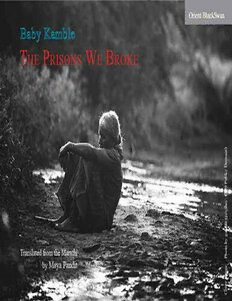
The Prisons We Broke PDF
Preview The Prisons We Broke
Baby Kamble lives in Phaltan, a small town in the Satara district of Maharashtra. She is a veteran of the Dalit movement in Maharashtra. Inspired by the radical leadership of Dr. Babasaheb Ambedkar, she has been involved with the struggle from a very young age. She has established a government approved residential school for socially backward students in Nimbure, a small village near Phaltan. She has been honoured with awards for her literary and social work. Collections of her poetry have also been published. Maya Pandit is an activist who is involved with the womens and teachers’ movements in Maharashtra for the last two decades. She has published research papers on issues in the women’s movement as well as education. She has also been associated with the alternative Marathi theatre and has translated Marathi plays into English. She now works as a professor and teacher educator at English and Foreign Languages University, Hyderabad. For our entire range of books please use search strings "Orient BlackSwan", "Universities Press India" and "Permanent Black" in store. My Years with Boss At Gemini Studios ASHOKAMITRAN THE PRISONS WE BROKE Orient Blackswan Private Limited Registered Office 3-6-752 Himayatnagar, Hyderabad 500 029 (A.P.), INDIA e-mail: [email protected] Other Offices Bengaluru, Bhopal, Chennai, Ernakulam, Guwahati, Hyderabad, Jaipur, Kolkata, Lucknow, Mumbai, New Delhi, Noida, Patna, Vijayawada © Orient Blackswan Private Limited 2008 First Published 2008 Reprinted 2009, 2011, 2014, 2015 eISBN 978-93-86689-10-8 e-edition:First Published 2017 ePUB Conversion: Techastra Solutions Pvt. Ltd. All rights reserved. No part of this publication may be reproduced, distributed, or transmitted in any form or by any means, including photocopying, recording, or other electronic or mechanical methods, without the prior written permission of the publisher, except in the case of brief quotations embodied in critical reviews and certain other noncommercial uses permitted by copyright law. For permission requests write to the publisher. For all my comrades who wish to change the world Contents Cover Title Page Introduction The Prisons We Broke An Interview with Baby Kamble Afterword Glossary Acknowledgements It has been my privilege to translate Baby Kamble’s Jina Amucha into English. These memoirs were first serialised in 1984 in Stree, a Marathi women’s magazine, and later published as a book in 1986. The memoirs have been translated into many languages such as Hindi, Urdu, Punjabi, French and Spanish. It gives me great pleasure to have been able to make this book available to readers of English. Translating these memoirs has not been easy. Baby Kamble uses the dialectal Marathi of the Mahars living around Phaltan—a small town in Satara district of Maharashtra—while writing about the life of her community, and a standard and more formal language for discussing political developments. The dialectal Marathi comes alive with live cadences, subtle humour and varied tonal patterns. I am aware that much of that flavour is probably lost in translation. The last chapter in this translation is an addition and is being published for the first time. Many details of Baby Kamble’s growth as an activist are recorded in this chapter. Another distinctive feature of this work is a long interview with Baby Kamble, where she discusses her personal life and work, and raises many issues related to women and patriarchy, family and violence, problems encountered by Dalit women in the articulation of their experiences and in political struggles. During the course of this translation, I have received help from many quarters. I would especially like to thank K. Satyanarayana for his help in the initial stages of this project and later on for having read the translation; Jayanti Alam, for reading the initial draft of the translation and pointing out many problem areas as well as for her extremely valuable suggestions. The responsibility for any gaps that remain in the final translation are, of course, entirely mine. I would like to thank Malathy Krishnan and Meera Manavi for reading the translation and for their encouragement; Baby Kamble and her family for giving me so much time and making me and Uday feel at home; Uday for being with me throughout and for helping at each stage of this project, including the interview; Nikhil and Neeraj for their invaluable support. I do not know what I would have done without them. I am grateful to Prakash, Kumari and Nagamani for taking care of the home front. Without them cooking, cleaning and washing, this translation would not have been possible. And, finally, Sivapriya for taking a keen interest in this project. MAYA PANDIT
